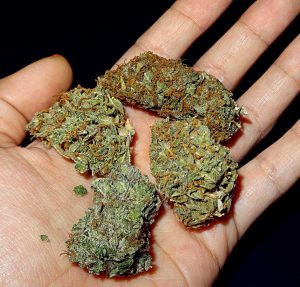 Illinois has decriminalized the possession of small amounts of marijuana in Illinois. As of January 1, 2020, you can legally possess up to 30 grams cannabis flower. If you are visiting the State of Illinois, you can legally possess half of the amount that residents of Illinois can possess.
Illinois has decriminalized the possession of small amounts of marijuana in Illinois. As of January 1, 2020, you can legally possess up to 30 grams cannabis flower. If you are visiting the State of Illinois, you can legally possess half of the amount that residents of Illinois can possess.
Since marijuana possession was legalized in Illinois at the beginning of this year, I have noticed a big increase in the number of people arrested for the illegal possession of cannabis in their motor vehicle. The issue of having marijuana in a vehicle is misunderstood by many people and is leading to the arrest of many people. The other day, I met with a client who was pulled over by a police officer for a speeding violation. When the police officer asked the client if he had anything in his vehicle, the client voluntarily admitted that he had a small amount of cannabis in the ashtray of his vehicle. The client mistakenly believed that since the possession of marijuana is now permitted in Illinois, that he could transport marijuana in his vehicle without any limitations or consequences. After the client admitted that he had marijuana in his vehicle, he was asked to exit his vehicle and was placed under arrest. This is has become a common occurrence in Illinois
Under Illinois Law, you cannot smoke marijuana in any motor vehicle. You cannot smoke marijuana near anyone under the age of 21. Anyone under the age of 21 cannot legally possess any amount of marijuana in Illinois. You can legally transport marijuana in your motor vehicle but it must be out of arm’s reach of the driver and must be completely sealed in its original packaging. The same rule applies to medical marijuana patients who are transporting medical marijuana in their vehicle. If you buy Medical Marijuana at the Medical Marijuana Dispensary, they will put the product in its original packaging in a paper bag and staple it so that you do not have any problems if you are pulled over by the police.
 Chicago Criminal Lawyer Blog
Chicago Criminal Lawyer Blog


 On January 1, 2020, at 6 am, Possession of recreational Marijuana will become legal in Illinois. But, there will be limitations to the legalization of the Possession of Marijuana. Violating any of the restrictions in the new law can get you in trouble with the law for the Illegal Possession of Marijuana in Illinois. If you are an Illinois resident, or planning on visiting Illinois, and are thinking about taking advantage of the new law legalizing the recreational use of marijuana, you should be aware of what you can legally do, and what you cannot do under the new law. If you do not know what the rules are and what the limitations are, you could find yourself being arrested, receiving an expensive ticket, or even facing a criminal case for Possession of Marijuana.
On January 1, 2020, at 6 am, Possession of recreational Marijuana will become legal in Illinois. But, there will be limitations to the legalization of the Possession of Marijuana. Violating any of the restrictions in the new law can get you in trouble with the law for the Illegal Possession of Marijuana in Illinois. If you are an Illinois resident, or planning on visiting Illinois, and are thinking about taking advantage of the new law legalizing the recreational use of marijuana, you should be aware of what you can legally do, and what you cannot do under the new law. If you do not know what the rules are and what the limitations are, you could find yourself being arrested, receiving an expensive ticket, or even facing a criminal case for Possession of Marijuana. The topic of Marijuana and the talk about possibly legalizing the Possession of Marijuana in Illinois is a big topic in the news and among Illinois residents. In addition, Illinois legalized the use of Medical Marijuana a few years ago. The movement towards legalizing Marijuana and the adoption of Medical Marijuana in Illinois has created confusion about whether you can be arrested for Possession of Marijuana and what the potential consequences could be. I want to talk about this issue and clear up any confusion about what the status of the Illinois Marijuana laws are today.
The topic of Marijuana and the talk about possibly legalizing the Possession of Marijuana in Illinois is a big topic in the news and among Illinois residents. In addition, Illinois legalized the use of Medical Marijuana a few years ago. The movement towards legalizing Marijuana and the adoption of Medical Marijuana in Illinois has created confusion about whether you can be arrested for Possession of Marijuana and what the potential consequences could be. I want to talk about this issue and clear up any confusion about what the status of the Illinois Marijuana laws are today. In recent years, laws regarding the Possession and Use of Marijuana have been changing throughout the country. This is true in the State of Illinois. In 1931, The Illinois Legislature made the recreational use of marijuana illegal. This legislation was part of a national trend which made the use of marijuana illegal nationally. In recent years, a new national trend has swept throughout the country which is having the opposite effect on the use of Marijuana. This trend clearly appears to be more accepting of the medical and recreational use of Marijuana. This national trend has swept into Illinois as well. In 2016, the Illinois Legislature decriminalized the possession of small amounts of Marijuana in Illinois. If you are caught with 10 grams or less of Marijuana, you will no longer be placed under arrest and subject to criminal prosecution and criminal penalties. In 2016 the State of Illinois made the possession of 10 grams or less of Marijuana a Municipal Ordinance Violation which only carries a civil penalty. The City of Chicago decriminalized the possession of small amounts of Marijuana in 2012.
In recent years, laws regarding the Possession and Use of Marijuana have been changing throughout the country. This is true in the State of Illinois. In 1931, The Illinois Legislature made the recreational use of marijuana illegal. This legislation was part of a national trend which made the use of marijuana illegal nationally. In recent years, a new national trend has swept throughout the country which is having the opposite effect on the use of Marijuana. This trend clearly appears to be more accepting of the medical and recreational use of Marijuana. This national trend has swept into Illinois as well. In 2016, the Illinois Legislature decriminalized the possession of small amounts of Marijuana in Illinois. If you are caught with 10 grams or less of Marijuana, you will no longer be placed under arrest and subject to criminal prosecution and criminal penalties. In 2016 the State of Illinois made the possession of 10 grams or less of Marijuana a Municipal Ordinance Violation which only carries a civil penalty. The City of Chicago decriminalized the possession of small amounts of Marijuana in 2012. On Tuesday, Illinois Governor Bruce Rauner, signed into law a measure that drastically expands the Illinois Medical Marijuana Program. The main focus of the expanded Medical Marijuana legislation is to attack the massive opioid epidemic which led to the loss of almost 2,000 lives in Illinois in 2016, and roughly 72,000 people throughout the country.
On Tuesday, Illinois Governor Bruce Rauner, signed into law a measure that drastically expands the Illinois Medical Marijuana Program. The main focus of the expanded Medical Marijuana legislation is to attack the massive opioid epidemic which led to the loss of almost 2,000 lives in Illinois in 2016, and roughly 72,000 people throughout the country. Yesterday, the United States Supreme Court issued several opinions on cases that had been closely watched by observers. The case that has received most of the public attention involves legalized sports betting. But lost in the coverage was the release of two opinions involving the 4th and 5th Amendment rights of criminal defendants. These opinions expand the rights of motorists in their vehicles and the rights of criminal defendants facing prosecution in Criminal Courts. I want to take this opportunity to discuss these two cases and how they will impact the criminal law.
Yesterday, the United States Supreme Court issued several opinions on cases that had been closely watched by observers. The case that has received most of the public attention involves legalized sports betting. But lost in the coverage was the release of two opinions involving the 4th and 5th Amendment rights of criminal defendants. These opinions expand the rights of motorists in their vehicles and the rights of criminal defendants facing prosecution in Criminal Courts. I want to take this opportunity to discuss these two cases and how they will impact the criminal law. Yesterday, Kane County State’s Attorney, Joe McMahon, announced that Kane County saw a 7% increase in the number of felony cases filed by the Kane County State’s Attorney’s Office in 2017. The increase in the filing of felonies in Kane County continues a rise in the number of felony cases filed that began in 2015. In 2007, Kane County saw 3,349 felony cases filed. That number declined from that year until 2015, when 2,011 felony cases were filed in Kane County. In 2016, 2,255 felony cases were filed. In 2017, 2,413 felony cases were filed. That represents a 7% increase over 2016.
Yesterday, Kane County State’s Attorney, Joe McMahon, announced that Kane County saw a 7% increase in the number of felony cases filed by the Kane County State’s Attorney’s Office in 2017. The increase in the filing of felonies in Kane County continues a rise in the number of felony cases filed that began in 2015. In 2007, Kane County saw 3,349 felony cases filed. That number declined from that year until 2015, when 2,011 felony cases were filed in Kane County. In 2016, 2,255 felony cases were filed. In 2017, 2,413 felony cases were filed. That represents a 7% increase over 2016. Recently, I won a Source of Funds hearing at the Maywood Courthouse. At my client’s initial bond hearing, the judge required that my client prove the source of funds prior to being allowed to post the required amount of the cash bond. Immediately after the bond hearing I was contacted by my client’s family and hired to do whatever I could to get my client out of jail. I immediately got to work and today, my client is a free man. Here’s how this case started and how I was able to get him released.
Recently, I won a Source of Funds hearing at the Maywood Courthouse. At my client’s initial bond hearing, the judge required that my client prove the source of funds prior to being allowed to post the required amount of the cash bond. Immediately after the bond hearing I was contacted by my client’s family and hired to do whatever I could to get my client out of jail. I immediately got to work and today, my client is a free man. Here’s how this case started and how I was able to get him released. In July of 2016, Illinois Governor Bruce Rauner signed legislation into law which makes possession of small amounts of marijuana a civil matter and not a criminal matter. This new law made Illinois the 17th state to decriminalize the possession of small amounts of marijuana. This means that if you are caught with the possession of 10 grams of marijuana or less, you will be issued a ticket charging you with a civil offense which carries a fine of up to $200. However, individual towns are allowed to add additional penalties to the tickets, such as drug treatment or classes. The new law also makes two more changes to Illinois law. First, anyone charged under this new law will have the case expunged from their record automatically 6 months after the offense occurs. Expungements for these citations will happen automatically twice a year, January 1 and July 1. This was added to the statute to make sure that such a case would not limit the ability of people, especially young people, to be able to obtain a job. The second change has to do with DUI’s. Under the old law, Illinois had a “no tolerance” policy when it came to driving a motor vehicle with the presence of any trace of marijuana in their blood system. Under the old law, if you had ingested marijuana a few weeks ago and were driving a motor vehicle, you could be charged with a DUI even if there were no signs of impairment. Under the new law you cannot be charged with a DUI unless you have 5 nanograms of THC (the active ingredient of marijuana) in your blood, or 10 nanograms or more in your saliva.
In July of 2016, Illinois Governor Bruce Rauner signed legislation into law which makes possession of small amounts of marijuana a civil matter and not a criminal matter. This new law made Illinois the 17th state to decriminalize the possession of small amounts of marijuana. This means that if you are caught with the possession of 10 grams of marijuana or less, you will be issued a ticket charging you with a civil offense which carries a fine of up to $200. However, individual towns are allowed to add additional penalties to the tickets, such as drug treatment or classes. The new law also makes two more changes to Illinois law. First, anyone charged under this new law will have the case expunged from their record automatically 6 months after the offense occurs. Expungements for these citations will happen automatically twice a year, January 1 and July 1. This was added to the statute to make sure that such a case would not limit the ability of people, especially young people, to be able to obtain a job. The second change has to do with DUI’s. Under the old law, Illinois had a “no tolerance” policy when it came to driving a motor vehicle with the presence of any trace of marijuana in their blood system. Under the old law, if you had ingested marijuana a few weeks ago and were driving a motor vehicle, you could be charged with a DUI even if there were no signs of impairment. Under the new law you cannot be charged with a DUI unless you have 5 nanograms of THC (the active ingredient of marijuana) in your blood, or 10 nanograms or more in your saliva. On January 1, 2014, Medical Marijuana became legal in Illinois. The Illinois Medical Marijuana policy is stricter than most other states that have enacted Medical Marijuana. Illinois does not allow Medical Marijuana to be grown at home. The Marijuana must be cultivated at a state-regulated facility that is under strict rules and regulations. To be allowed to use Medical Marijuana, you must apply for permission from the Illinois Department of Health. The application process is strict and it may take several months for you to be approved. If you are approved to use Medical Marijuana, you will be given an identification card. You will only be allowed to purchase 2.5 ounces of medical marijuana every 14 days. The program is tightly restricted and supervised.
On January 1, 2014, Medical Marijuana became legal in Illinois. The Illinois Medical Marijuana policy is stricter than most other states that have enacted Medical Marijuana. Illinois does not allow Medical Marijuana to be grown at home. The Marijuana must be cultivated at a state-regulated facility that is under strict rules and regulations. To be allowed to use Medical Marijuana, you must apply for permission from the Illinois Department of Health. The application process is strict and it may take several months for you to be approved. If you are approved to use Medical Marijuana, you will be given an identification card. You will only be allowed to purchase 2.5 ounces of medical marijuana every 14 days. The program is tightly restricted and supervised.